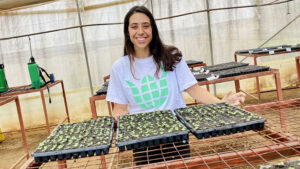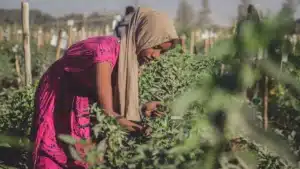In my first pilot project with Plant Breeders Without Borders, I was asked to go to Ethiopia to train smallholder farmers to breed their own forage crops for countries developing dairy industry. Ethiopia has experienced many famines, and with a population of close to 80 million people in a good year, everyone can be fed, but in a bad year many people can starve.
While I was there, I thought: Why haven’t seed companies established themselves in Ethiopia to sell seed?
Africa is predicted to be the continent with the greatest growth over the next few decades. When a famine strikes, plenty of seed is given away to people as handouts. This makes it impossible for a company to try and sell seed when it is being given out for free.
What’s more frustrating for the locals is that most seed that is given out is not from Africa, but from Western countries. Although this is OK for western farmers that would be paid full market price for their seed that is used as foreign aid, this can have devastating effects on the local market price in the region of the famine. There may be neighboring countries where the famine hasn’t occurred, and their local price of seed is decreased due to the free seed coming in from overseas. It would make sense for aid organizations to try and access seed from neighboring countries so that local prices are not affected.
The greatest aid the Western world can give to the developing countries is free access to markets. When you travel in developing countries, it is common to see produce from the Western world being sold in marketplaces and lowering the local price. It may have been an oversupply of the product in the Western world, which is then flooded onto developing markets. Unfortunately, if the roles were reversed this could not occur. When there is an oversupply of agriculture products in developing countries, you tend to see them rotting. In the Western world there are tariffs and trade restrictions preventing oversea imports that could flood the market and damage the price that their local farmers receive.
What is the solution? We know that the world can currently grow enough food to feed everyone, but it is not evenly distributed. Maybe we need and international body to look at food production on a global scale. In times of food shortage in certain locations, they may help aid agencies identify where food is grown more locally and that is in surplus. It also means that food does not have to travel great distances to the consumer, meaning less food miles.
There is a place for handouts in times of famine. However, after the famine has passed, $1 spent on prevention of hunger means $3 less is needed to be spent in times of famine as handouts. So, then the question becomes: what is prevention of hunger? Maybe it is the education of people to have the confidence to run their own business and produce seeds for the local consumer. When you travel in developing countries it is the middleman in the marketplace that is making the most money.
This system needs to be overhauled to allow farmers to be more profitable. The formation of co-operatives can help with this. Or maybe it is giving loans to smallholder farmers so they can buy what they need to produce a harvest and then they pay the loan back with interest. You can now see social credit unions in the Western world where people are willing to invest their money into projects where they know their returns won’t be a great as investing in other projects, but the social impact will be much greater.
There is only one constant in life and that is change. Humankind can create solutions to the problems that we face. We just must be willing to work together to help these solutions work.











